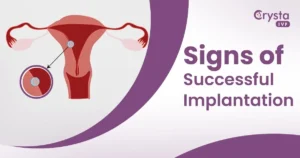Fertility health is an important part of overall well-being, yet it is often overlooked. It is a natural process that allows us to create a new life and has significant implications for our physical, mental, and emotional health.
Research has shown that fertility health can have wide-reaching effects on physical health, such as reducing the risk of certain diseases, improving immune function, and regulating hormones. It can also positively impact our mental health by reducing stress and anxiety, as well as improving our self-esteem and body image.
Furthermore, fertility health can provide us with an emotional connection to our partner, our family, and our community. Taking care of our fertility health is essential for our overall well-being, so it’s important to take your fertility seriously and ensure that it remains in good shape.
But how do you know if your fertility health is in good shape?
Most people assume fertility is a bit of a mystery until they try to conceive and are recommended infertility treatments. With the increasing cases of infertility worldwide in both men and women, it becomes more necessary to look closely at the signs that tell a lot about your reproductive health.
Here we curated the essential fertility signs to look for each month, so keep on reading and take control of your fertility health.
9 Signs of Good Fertility Health
There are a variety of signs that can indicate good fertility in both men and women. For men, some of these signs include a healthy sperm count, high-quality sperm that can swim quickly and easily, and a good balance of hormones.
For women, good fertility indicators include regular ovulation, the presence of cervical mucus, and the regularity of menstrual cycles.
Additionally, a woman’s age is essential in determining her fertility, with women under 35 typically having better fertility odds than those over 35.
Sign 1: Regular Menstrual Cycles
Regular menstrual cycles (every 21-35 days) indicate that the body is producing the necessary hormones, which are essential for healthy fertility. It is also essential to keep track of your menstrual cycle using a calendar, period tracker app, or digital notes.
Irregular menstrual periods may signify conditions like Endometriosis or Polycystic ovary syndrome (PCOS) that may cause fertility problems and inability to conceive.
Sign 2: You Have Normal Blood Flow During Periods
Though everyone’s periods are different, if your blood flow during periods isn’t too heavy or too low, your uterine lining is shedding the average amount each month which is a sign of good fertility health.
However, slightly up and down are common. As long as it is consistent, and timing is consistent, there’s nothing to worry about.
Sign 3: Breast Tenderness
Right after ovulation, your body increases the level of reproductive hormones such as progesterone, which makes your breast sore and achy and gives an overall heavy feeling. So, breast tenderness may be a sign that ovulation occurred at that time of the month, assuring normal fertility health.
Sign 4: Increased Sexual Desire
During your fertility window, just before ovulation occurs, your body starts producing reproductive hormones such as estrogen and testosterone, which are likely to increase your sexual desire. Increased sex drive in both males and females is a sign that hormones are working as expected, which is good for fertility health.
Along with rising sexual desire, you may also experience a higher-pitched voice, a slight change in facial structure, and sexual mood.
Sign 5: You’ve Never Experienced Pelvic Infection
STDs, like chlamydia and gonorrhea and chronic conditions, often lead to Pelvic inflammatory disease (PID), infection of the female reproductive organs (pelvis, ovaries, fallopian tube, cervix, and uterus), and thus causing difficulty getting pregnant.
However, if you have never had any pelvic infection, your fertility is in good health, and you’re more likely to conceive.
Sign 6: You’ve Clean Gynecologist Record
Having a clean gynecologist record is one of the most important signs of good fertility, and this may also mean that you could easily conceive a child. Some women have a history of specific fertility issues, including ovulation disorder, PCOS, hormonal problems, and damaged or blocked fallopian tubes, and such women may experience lower fertility rates.
Sign 7: Living a Healthy Lifestyle
Studies have shown that unhealthy eating habits, smoking, alcohol consumption, obesity, excessive caffeine intake, higher stress, inadequate sleep, and unhealthy habits are linked with poor fertility health. But if you’re eliminating these bad habits and have adopted a healthy lifestyle, pat yourself on the back.
Your fertility health significantly depends on your lifestyle. So make good lifestyle choices to keep your fertility in good shape. This includes eating a nutritional & well-balanced diet, exercising regularly, stress management, enough sleep, and quitting smoking and excessive alcohol consumption.
Sign 8: You Have Clear Discharge
Having clear vaginal discharge may signify good fertility health and that your body is preparing to conceive a child. During the middle of your menstrual cycle, you may experience copious amounts of clear, odorless vaginal discharge.
The discharge also facilitates sperm transportation through the cervix and shows good estrogen production and cervical gland function.
Sign 9: Change In Cervical Mucus
On normal days, your cervical discharge appears to be sticky and cloudy. But during ovulation, as your body produces more estrogen, it causes your cervical mucus to appear stretchy, similar to egg whites.
The change in cervical discharge creates a favorable environment for sperm to reach the egg. Change in cervical mucus says a lot about your fertility health.
Takeaway
Fertility health is an important factor in overall well-being. When your fertility is healthy, your body functions as it should, allowing you to conceive a child if you wish. But fertility health is about more than just having a child; it also affects your physical and mental health.
Good fertility health can help you maintain a healthy weight, reduce your risk of certain diseases, and even improve your overall mood. Fertility health also contributes to healthier relationships, as it can help couples better understand their bodies and fertility cycles.
Taking care of your fertility health is an essential part of taking care of yourself and can make a big difference in your overall well-being.
We recommend talking with the best IVF Clinic in Delhi NCR at Crysta IVF to assess your overall fertility health and learn ways to improve it. Or suppose you’re diagnosed with fertility issues that are hampering your ability to conceive. In that case, our experienced fertility doctor team will help you with your parenthood, possibly using fertility treatment options.




